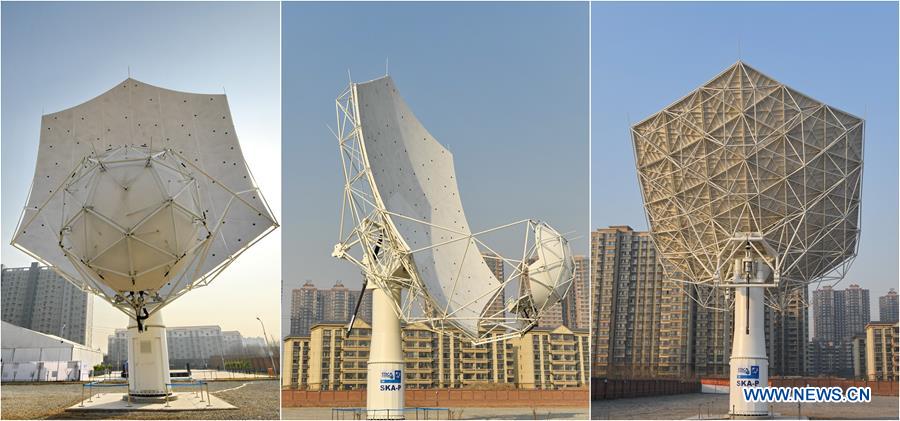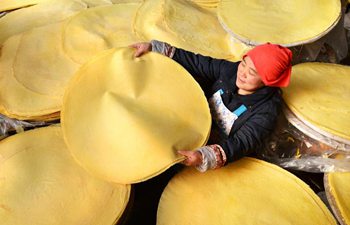
Combined photo taken on Feb. 6, 2018 shows the frontage (L), sideview (C) and the backside of the prototype dish for Square Kilometer Array (SKA) radio telescope. The first fully assembled dish for the SKA radio telescope was unveiled Tuesday in Shijiazhuang, capital of north China's Hebei Province. The SKA, an international effort to build the world's largest radio telescope using arrays in Australia and South Africa, is not a single telescope, but a collection of telescopes or instruments, called an array, to be spread over long distances. (Xinhua/Mu Yu)
SHIJIAZHUANG, Feb. 6 (Xinhua) -- The first fully assembled dish for the Square Kilometer Array (SKA) radio telescope was unveiled Tuesday in Shijiazhuang, capital of north China's Hebei Province.
The SKA, an international effort to build the world's largest radio telescope using arrays in Australia and South Africa, is not a single telescope, but a collection of telescopes or instruments, called an array, to be spread over long distances.
After completion, the SKA will detect faint radio waves from deep space with a sensitivity about 50 times greater than that of the Hubble telescope. Individual radio telescopes will be linked to create a total collecting area of about 1 million square meters.
The state-of-the-art 15-meter diameter dish unveiled Tuesday is one of two final prototypes that will be tested ahead of production of an early array.
It is the first time China has played a leading role in the development of the SKA dish, showing that the country has made technological breakthroughs in radio telescopes, said Hao Jinxin, deputy head of the National Astronomical Observatories under the Chinese Academy of Sciences.
"This is a major achievement by all the partners involved," said Philip Diamond, director-general of the SKA Organization, which is overseeing the project.
"Our Chinese partners are extremely well resourced. They have demonstrated that they have the technology and capability to construct a telescope with the specifications that the SKA requires," added Mark Harman, SKA Organization project manager for the dish consortium.
A second dish will be shipped to South Africa and assembled there to conduct real observations for the first time in the next few months, the SKA Organization said on its website.
Supported by 10 member countries including China, Australia, Canada, South Africa and Britain, the SKA has attracted scientists and engineers from about 20 countries.















